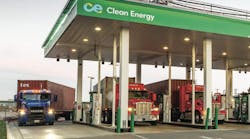The holiday shipping season is upon us, and predictions are that sales will be up 7.5% this year, per Bain & Co. Total sales are predicted to reach $915 billion. If the sales predictions are accurate, that’s a lot of shipping either to brick and mortar stores or to end user homes and businesses. Trucks of all classes are going to be racking up lots of miles.
This seems like a good time to remind fleets and drivers about some of the fuel economy lessons we learned from Run on Less 2017, when seven drivers delivering real freight in trucks spec’d with commercially available technology averaged 10 mpg over the course of the when the national fleet average is 6.3.
See also: Smaller carriers face more risk as fuel prices resume rise
We at NACFE call our finding the 10 actions to achieve 10+ mpg. They include suggestions on items to spec on your vehicles as well as other operation changes a fleet can make to get closer to 10 MPG. I think ahead of the holiday season is a good time to reshare the list.
Five truck items you can spec to help improve fuel economy
1. Buy all available tractor aerodynamics
Fleets should start their specification process with all available sleeper tractor aerodynamics. NACFE has found that tractor aerodynamics have a very high ROI for linehaul applications, and fleets should only remove items if they suffer frequent damage in their specific operation.2. Adopt appropriate trailer aerodynamics
Fleets should address trailer aerodynamics in relation to the side, rear, and front (the tractor-to-trailer gap) and adopt the most appropriate technologies depending on route, drivers, maneuverability, etc.3. Embrace low rolling resistance tires
Low rolling resistance tires are critical for a fleet to get high miles per gallon, but the most fuel-efficient tires are not right for every fleet, application, or region. A productive tire purchase and management process takes focus but will pay off.4. Implement the right axle configuration
Fleets should use the correct axle configuration for the job, depending on the payload, speed, maneuverability, fleet practices such as tire management, and even resale value if the asset will be sold before its useful life is exhausted.5. Use downsped engines and AMTs
It is important to use automated manual transmissions that enable other technologies such as downspeeding. The duty cycle is key to these choices and, in particular with downspeeding, buyers should only apply the most aggressive downspeeding to tractors with high average speed where the amount of starts and stops are low.Five trucking operational changes you can make to improve fuel economy
1. Optimize cruise control and vehicle speed
Fleets should maximize the parameter settings for cruise control to gain the most fuel savings. While a slower speed burns less fuel, there may be times when a faster speed can get a trucker more revenue. Thus, the conditions dictate whether it makes more sense economically to drive faster and burn more fuel.
2. Provide tools to reduce idle times
Drivers should shut the truck off whenever and wherever possible. They should use technology and engine parameter settings to reduce idle time.
3. Build a culture of methodically choosing technologies
Fleets should have a process to constantly monitor, adjust, and act upon new technology opportunities. Best practices include comprehensive understanding of the performance, either by testing or through industry involvement; robust payback or return on investment analyses; and supplier selection.
4. Keep equipment maintained
The technologies employed on tractors and trailers work best when the trucks are maintained well. It is important to employ solid maintenance practices and utilize technology to help the equipment run as it is intended (e.g., automatic tire inflation on trailers, use of low-viscosity lubrication, alignment, replacing or cleaning filters, etc.).
5. Educate and incentivize conscientious drivers
Run on Less benefited by having the trucks operated by some of the most proficient drivers on the road. Hiring, educating, and incentivizing drivers for the best fuel efficiency possible is a critical part of a successful fuel management system.
If taking on all 10 of these things seems daunting, start with one or two. Every small step you take to improve fuel efficiency is a step in the right direction and, given the miles your trucks will be driving this holiday season, could result in big savings.



